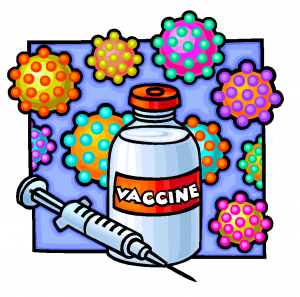Vaccine Shedding: Should You Really Be Concerned?
Question: My child just got the MMR vaccine and has a bit of a rash. Should I be concerned about him giving his friends the measles?
Short answer: Nope.
Long answer: Sounds like you’re worried about “vaccine shedding”.
Let’s first discuss what “viral shedding” is. When someone gets sick with a virus, they become contagious and can spread the virus to someone else. The spread happens when the viral particles are expelled from the sick person’s body via a cough or sneeze, or transferred by direct contact to another person. The “shedding” is the viral particles leaving the sick person’s body. You can probably picture this happening, like shedding dead skin cells. Virus all over the place!
When people throw the term “vaccine shedding” around, they are referring to the virus in the vaccine being shed from a recently vaccinated person’s body. Before getting into vaccine shedding, I want to stress that this is super rare. Lots of parents are concerned about their children catching viruses from vaccinated children, when they should really be concerned about catching the virus from unvaccinated children.
Vaccine shedding research tells us that only live vaccines are a concern for shedding. And most vaccines are not live and don’t shed. The vaccines that are NOT live include: DTaP, Tdap, influenza shot, Hib, hepatitis A , hepatitis B, PCV, IPV, HPV, and the meningococcal vaccine.
So what about the live vaccines?
MMR is a live vaccine and based on research, the measles and mumps attenuated viruses do not cause shedding. The rubella virus has been found to rarely shed into breast milk.
Varicella vaccine virus doesn’t shed unless the person develops the chicken pox (vesicular) rash after getting vaccinated. According to immunize.org, there are only about 5 cases out of about 55 million doses of the vaccine given, of people getting sick due to vaccine shedding.(5)
Rotavirus vaccine virus has been found to shed in the stool. Therefore, if someone taking care of a child who recently got the rotavirus vaccine has a severely weakened immune system, they should avoid diaper changing for a week or so after the child has been vaccinated.
Live (nasal mist) influenza vaccine shedding is possible, but very rare. However, shedding occurs in much lower amounts than if someone were to be just sick with the actual virus. And only severely immunocompromised people need to worry about being around someone who has recently gotten a flu vaccine.
True vaccine shedding really only happens with the oral polio vaccine and the smallpox vaccine, two vaccines that aren’t really used anymore (currently children get the inactivated polio vaccine shot). These viruses can be shed, however those exposed to the shed virus don’t typically get sick because the virus is in an attenuated (weakened) form. People potentially at higher risk for getting sick with these viruses would be those who have already weakened immune systems.
So, only those with very severely weakened immune systems need to be worried about vaccine shedding. This would mean someone, for example, who is getting a stem cell transplant. Those with moderate immunologic deficiencies don’t need to worry much, and those who live with someone with an immunologic deficiency can and should get all of their vaccinations. According to the Medical Advisory Committee of the Immune Deficiency Foundation, these vaccines pose little risk to the immunocompromised. It may be even more important to protect those with weakened immune systems from natural viral infection by getting these vaccines.
People DO shed the actual viruses if they are not vaccinated and get sick naturally. Vaccines hold slim to no role in spreading infection by viral shedding.
Resources:
- Centers for Disease Control and Prevention (CDC). www.cdc.gov
- Iannelli, V. “Live Vaccines and Vaccine Shedding.” Vaccine Basics. 21 February 2015.
- Medical Advisory Committee of the Immune Deficiency Foundation. “Recommendations for live viral and bacterial vaccines in immunodeficient patients and their close contacts.” The Journal of Allergy and Clinical Immunology. April 2014. Vol. 133. Iss. 4. pp. 961–966 .
- 4. Lievano, F.A. “Lack of Evidence of Measles Virus Shedding in People with Inapparent Measles Virus Infections”. The Journal of Infectious Diseases. 2004. Vol. 189 (1). pp. 165-70.
- immunize.org: http://www.immunize.org/catg.d/p4202.pdf
4 thoughts on “Vaccine Shedding: Should You Really Be Concerned?”
Comments are closed.



I just put my head in my hands. Go click on some of my articles on these topics for my response to these things.
Crystal Rose Shedding, you mean? Oh, there’s a LOT of that about, led by the vaccinated brigade of religious adherents.
https://www.cbsnews.com/news/mutant-polio-virus-spreads-in-nigeria/
http://jcm.asm.org/content/50/11/3427.long
https://web.archive.org/web/20150203190322/https://www.biooutsource.com/virus-and-vectors/clinical_support/virus_and_vector_shedding/
http://www.microbiologyresearch.org/docserver/fulltext/jgv/83/12/0833103a.pdf?expires=1521434234&id=id&accname=guest&checksum=AB285BD37A8E617AEC042757D8335771
http://www.upmc-cbn.org/report_archive/2012/cbnreport_12212012.html
https://www.ncbi.nlm.nih.gov/pmc/articles/PMC2938738/
https://jamanetwork.com/journals/jama/article-abstract/195402?redirect=true
https://www.cdc.gov/mmwr/preview/mmwrhtml/mm5925a2.htm
https://academic.oup.com/jid/article/201/10/1535/993085
http://journals.plos.org/plosone/article?id=10.1371/journal.pone.0003433
https://www.ncbi.nlm.nih.gov/pubmed/21513761
http://www.thelancet.com/journals/laninf/article/PIIS1473-3099%2808%2970231-7/abstract
https://www.ncbi.nlm.nih.gov/pubmed/16266774
http://www.eurosurveillance.org/content/10.2807/1560-7917.ES2013.18.49.20649
https://academic.oup.com/aje/article/151/5/524/117275
http://pediatrics.aappublications.org/content/106/2/e28.full
And how about the twisted logic of vaccine proponents – it looks like a duck, it quacks like a duck, but it’s not a duck! (Polio-like, but it’d not possibly polio as we officially announced it was eradicated & to start again would stuff up our twisted statistics based on ever-changing criteria of disease classification!
So let’s just call it flaccid paralysis from an unknown organism from the same family as the polio virus – but NOT polio & call it “Enterovirus 68” to make it sound esoteric)
https://www.scientificamerican.com/article/is-a-wave-of-poliolike-symptoms-in-california-cause-for-alarm/
http://www.whale.to/v/polioaccuteflacid.pdf
https://well.blogs.nytimes.com/2014/10/03/enterovirus-68-and-paralysis-link-remains-uncertain/?_php=true&_type=blogs&_r=0Enterovirus
https://www.lrb.co.uk/v25/n07/edward-hooper/aids-and-the-polio-vaccine
So perhaps “herd immunity” should really be called “Herd Infection Vectoring” (HIV), with most infectees exhibiting chronic Subclinical Symptoms. That’s because with each successive vaccination (especially multiple shots) the child’s developing immune system is bombarded and overloaded until it finally gives up and stops reacting, causing underlying chronic infection and other diseases like cancer or SIDS pops up “mysteriously”.
http://journals.plos.org/plosone/article?id=10.1371/journal.pone.0008382
Meanwhile, vaccines mutate in their hosts – or are genetically altered – causing Frankenstein new super-strains which would never have existed had humans not decided to play God and muck about with the Natural Order!
Different people have different reactions!
Thank you for your plain explanation and your efforts to stem the tide of misinformation online!